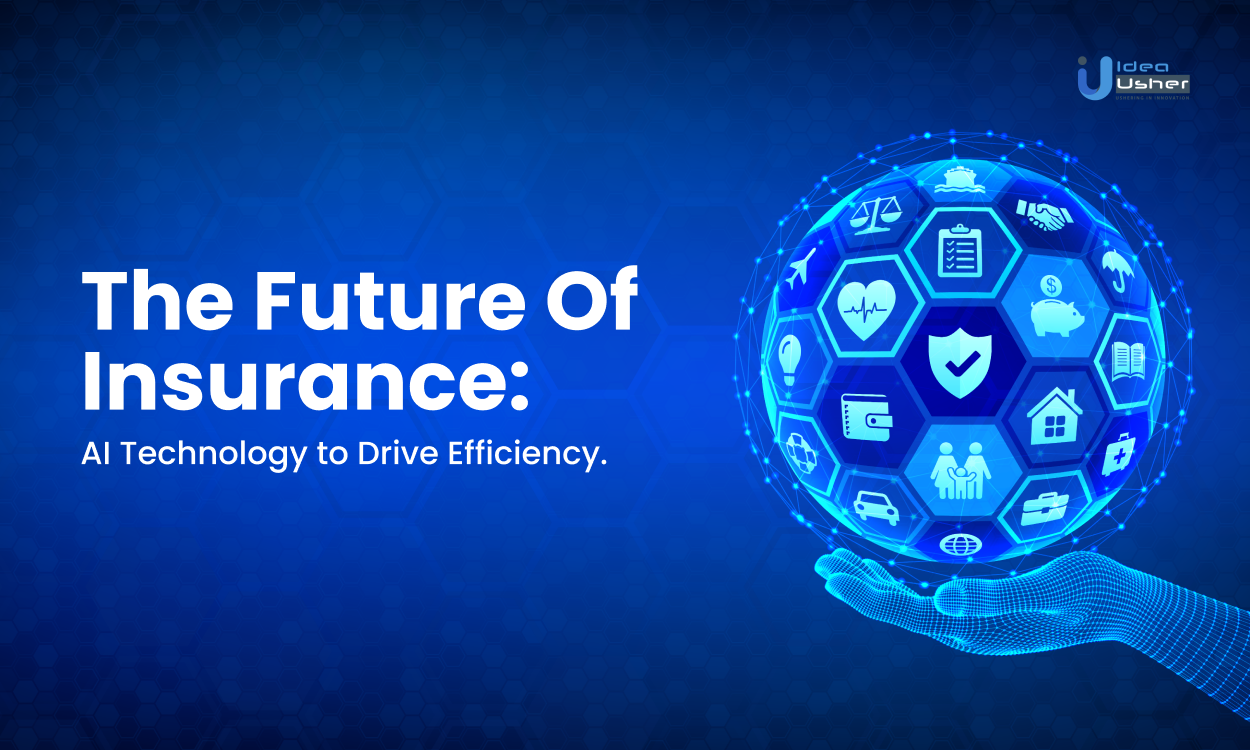- What is Artificial Intelligence?
- Exploring Integration of AI and Insurance
- Top Use Cases of AI in Insurance
- Is AI Incorporation in Insurance Beneficial to the Consumers?
- Benefits of Incorporating AI in Insurance
- Example of the Insurance Companies Using AI
- Upcoming Trend Changes in the AI-Insurance
- Why Does the Future of AI and Insurance Feel Distinctive?
- Conclusion
- FAQ’s

The covid-19 pandemic, the deadliest pandemic ever witnessed by the generations that locked us in our houses, made us think crucially on many aspects, and one of them is being insured to a particular risk during and after the pandemic; the insurance industry saw a brutal rise in the numbers of policies being sold from phone to car insurance and health to life insurances.
According to a Forbes advisor, every three in four people holds life insurance in countries like the United States of America.
Moreover, as we are seeing rising trends in AI, it shouldn’t be a surprise when we can see the integration of AI and insurance companies.
Data Bridge Market Research analyses that AI in the insurance market was valued at 3.64 billion dollars in 2022 and is expected to reach 35.77 billion dollars by 2030, at a CAGR of 33.06%
It is clear from the numbers that AI, blockchain, and machine learning can transform everyday businesses and the lives of individuals, making it easier and reducing human efforts.
Many insurance companies apply AI in simple steps like policy making, claim to handle, and claim issues to reduce human errors. Even blockchain is being used to secure transactions, detect insurance fraud, reduce risk, and maybe lower the cost of a policy. Integrating these technologies into the insurance process and steps can help make insurance more secure, fraud-free, and efficient.
So you might be wondering, is AI worth it, and can incorporating it in Insurance companies be beneficial?
So without further ado, let us answer that.
- What is Artificial Intelligence?
- Exploring Integration of AI and Insurance
- Top Use Cases of AI in Insurance
- Is AI Incorporation in Insurance Beneficial to the Consumers?
- Benefits of Incorporating AI in Insurance
- Example of the Insurance Companies Using AI
- Upcoming Trend Changes in the AI-Insurance
- Why Does the Future of AI and Insurance Feel Distinctive?
- Conclusion
- FAQ’s
What is Artificial Intelligence?

Before discussing AI’s integration with insurance, you should know what artificial intelligence is.
To put AI into context, when machines can start learning things and apply them to the real world, where computers can begin thinking and replicate the action of humans, AI can learn about data, store it in its central base and apply it accordingly when the need arises, as much as AI may sound as a futuristic plan it became a reality a long time ago, we use AI in our daily lives unknowingly.
AI is also integrated into our everyday OTT platforms like Netflix, where the recommendations that are being suggested are generated by complex calculations being carried out by the AI.
Today AI is being integrated into almost every business activity, from technology to the healthcare system. It is the new normal, and it becomes essential for companies to adapt to the latest technology to survive in the dynamic world.
Exploring Integration of AI and Insurance
The integration of AI has brought a complete change in the insurance industry. Traditionally insurance companies have been involved in generating loads of paperwork in the form of policies, negotiating on the premiums, signing the guidelines, and insured paying monthly or quarterly premiums to the company in case of claiming the insurance, it can be a headache as the person has to submit tonnes of paperwork and go through investigation to get the claim finally.
The whole process is lengthy and can take months to execute. This is where AI can be an excellent tool for insurance companies to ease the work and reduce the time.
Here is how AI can help insurance companies and premium payers.
- The policy-making can be left with the machine after the system is fed all essential documents and other information.
- Fraud detection from both sides that are insured and the insurer can be done quickly.
- The AI can generate a clean premium number that the insured has to pay, as in a traditional setup, there is a lot of negotiation; thus, an AI-generated number can never go wrong.
- Most importantly, a reduction in time for the whole process.
Top Use Cases of AI in Insurance
Below are the top cases of incorporation of insurance and artificial intelligence.
Pricing of Premiums
Pricing is the most effective way AI can be used in insurance policies. The AI can be fed with all the factors such as geographical factors, age, diseases, and many more generic factors. These can help to make the pricing strategies more prominent and even personalize the policies for each customer individually. This can also help reduce the conflicts between an insurer and the insured.
Insurance Claim Handling
Premium is one of the most significant factors in an insurance policy, and American insurance companies are estimated to collect more than 1 trillion dollars in premiums.
The insurance company spends a lot of money on claim investigation by hiring personnel looking deep into the claim process. An insurance business may save money on recruiting by automating many time-consuming operations associated with claims processing and payments. AI can also help reduce the time from months to a few days and help insurers provide more personalized than a generic policy.
Insurance Fraud Detections
This is one of the most crucial steps of an insurance process in a traditional manner, and it sometimes becomes complicated to detect. Thus, with AI’s help, the insurance company can detect any abnormality or derivation. At the same time, the insured applies for a claim since many insured people submit false information to get lower premiums, for example, fake medical certificates and vice-versa.
AI is a great revolution to know about any insurance fraud since the insurance market has an estimate of more than 40 billion dollars of claims per annum.
Is AI Incorporation in Insurance Beneficial to the Consumers?
The next question that arises is whether AI is going to benefit the premium payer. AI will be working in favor of the insurance companies, which will help reduce all kinds of efforts and streamline every claim process, but let us look at the consumer once.
In this case, AI is not one-sided and will benefit the consumer as AI-assisted risk assessment can assist insurers in better customizing plans so that clients pay for what they require. It can also reduce human error in the application process, increasing the probability that clients would receive programs that have been customized to their specific needs.
AI can also reduce the effort of applying and taking a claim since everything AI handles, all the document verification can be done within days, and the claim is ready for execution in no time.
Benefits of Incorporating AI in Insurance
There are many ways that AI can do what the existing insurance companies, as well as the employees, cannot incorporate. Let us have a look.
Claims Processes Reporting
The first step of claiming is reporting the accident to the insurance companies. Still, with the integration of AI, the complete process can be made human, and minimal human interference is required.
The insured can, in no time, trigger the process using their devices in the mobile application, and the AI chatbots can take over the issue and collect all the information.
Insurance Claim Processing
AI can streamline fraud detection by regulating all data extraction, claims formation, authorizations, approvals, payment tracking, and recovery track procedures. This can be combined with other applications to save time and money.
The claim process is the most crucial step and is a house of significant frauds that humans sometimes cannot detect; thus, AI is a great tool.
According to the reports submitted by McKinsey and Company, AI can reduce the claim regulation cost by 20-30 percent and processing time by 40-90 percent.
Advancement in Policy Selling
For a company to generate a good source of revenue, it must maintain a good record of selling a policy to generate revenue from premiums, companies need a good sales department, but to eliminate that, it is necessary to incorporate AI.
AI can be used to incorporate chatbots, where the customer can seek all the required information from the app and know about all kinds of things available, like cars, health, and life. Moreover, the chatbot can take the process further and even sell a policy through the only mobile application without requiring an agent to sell the policy.
Improvement in the Loss Process
With AI technology, Machine Learning, Deep Learning, and OCR, assessing damage has gotten easier and faster. It is now possible to do so simply by submitting an image of the damaged object.
Predicting possible losses and making suggestions speed up the loss estimating process.
Example of the Insurance Companies Using AI
Below are the major companies that have incorporated artificial intelligence in their operations.
Allstate
Allstate is an insurance company that has incorporated AI in its system; the AI-powered chatbots and virtual assistants know about the claim processes and other Allstate AI also uses user data to generate specialized policies for every particular use.
Geico
Geico has the technology and uses machine learning to analyze consumer and consumer trends for personalized insurance quotes and clean premium numbers.
Ping Ann
Ping An is a Chinese insurance business making significant investments in artificial intelligence. The company uses AI-powered chatbots to process claims, underwrite policies, and provide personalized insurance advice.
Zurich Insurance Group
Insurance Group relies on artificial intelligence to process claims, underwrite policies, and analyze client information. In addition, the company has created an AI-powered risk control platform that helps businesses identify and mitigate potential hazards.
Lemonade
Lemonade is an InsureTech firm that leverages AI technology to automate end-to-end insurance tasks. This has allowed them to minimize operational costs, provide lower rates, enhance client acquisition, and improve customer experience and engagement.
Upcoming Trend Changes in the AI-Insurance
We all agree that AI is a great tool to implement in insurance companies due to numerous benefits such as fraud detection, price quotes, and much more. So here are the upcoming trends we can expect soon in the insurance company due to artificial intelligence engagement.
Extended Reality
A much better and improved form of virtual reality can help the chatbots to see the object without ever getting the physical item in place. The AI can command the user to show the item, say a car; regarding car insurance, the chatbot can open a new window to deliver the item and get a better quote for the premium.
Data Improvement
The insurance companies are working on making data more accurate in the upcoming times; since data is the oxygen for AI, it is essential to feed AI with correct data so that the company can fight fraud and bring the best for the customer if the data is not accurate then it can lead to many miss happenings such as mispricing of premiums or at worst insurance frauds, which can destroy the purpose of AI in insurance.
Frictionless Business/ Understanding Consumer Trends
AI has the potential to help businesses better learn consumer habits, make significant recommendations, and simplify how their products are categorized and promoted. In other words, AI helps eliminate friction in consumer promotion. This could allow insurance companies to grow partner networks and modernize outdated processes. This AI application could provide users with more policy options from suppliers.
Why Does the Future of AI and Insurance Feel Distinctive?
Because AI is still an emerging technology, there is some doubt about its ability to improve the experience of insurance companies and their clients. AI is not a perfect system; it contains defects that computer scientists are continuously trying to resolve. These are some of the significant effects of AI on the insurance sector.
Job Loss
Major companies are moving towards integrating AI in their companies and letting major work like policy making, investigation, and claim execution on computers. Yet, many people prefer to talk to a live agent than depend on some AI. Still, if the companies ultimately turn to AI, this can lead to significant layoffs and increased unemployment in the economy. Thus a true example of how AI can take over the job market.
Privacy Concerns
Many customers are scared to share their personal information, documents, and personal data with an AI-generative chatbot because they feel that the data is being stored in a cloud where it can be misused, which many do not want.
Whereas the live agent takes on the data hand to hand and makes a note of the absolute importance, thus privacy is confined within the four walls in insurance app development as well.
Data Precision
In AI, data is oxygen. AI technology involves the collection and processing of data from numerous sources. However, ensuring accurate and trustworthy data will help make better business selections. Insurance companies can use reliable data to reduce risks and fraud before they occur.
Conclusion
In conclusion, incorporating AI in the insurance industry has brought significant benefits, including improved customer experience, increased efficiency, and reduced costs. With the help of AI-powered chatbots, virtual assistants, and risk management tools, insurance companies can provide personalized recommendations and process claims faster, leading to greater customer satisfaction.
In light of these developments, insurance companies must keep up with the latest technological advancements and incorporate AI into their operations. For businesses considering developing their AI-backed insurance app, partnering with a reliable and experienced technology provider is crucial.
At Idea Usher, we have a team of skilled developers who can help bring your AI-backed insurance app to reality. Our innovative technology solutions are tailored to meet the specific needs of your business, ensuring that your app is functional but also user-friendly and efficient. If you want to learn more about how Idea Usher can help you develop your AI-backed insurance app, contact us today for a free consultation. Let’s work together to revolutionize the insurance industry with the power of AI.
FAQ’s
Q.What is AI, and how is it being used in the insurance industry?
A. AI (Artificial Intelligence) refers to the ability of machines to learn from data and perform tasks that typically require human intelligence, such as speech recognition and decision-making. AI automates various processes in the insurance industry, such as claims processing, underwriting, and risk assessment. AI-powered chatbots and virtual assistants are also used to provide personalized customer service.
Q. What are the potential benefits of AI in insurance?
A. AI can bring numerous benefits to the insurance industry, such as faster claims processing, improved customer experience, personalized policy recommendations, accurate risk assessment, and fraud detection. AI-powered tools can also help insurers identify trends in customer behavior and market trends, enabling them to adjust their policies and pricing accordingly.
Q. What are the potential risks and challenges of AI?
A. One of the main risks of AI is the potential for bias in decision-making. AI algorithms are only as good as the data they are trained on, and if the data is biased, the resulting decisions may also be biased. There is also the risk of job displacement, as AI-powered tools may replace human workers in specific tasks. Additionally, there are ethical considerations regarding data privacy and the potential for misuse of AI.
Q. What is the future of AI?
A. The future of AI is expected to be significant, with continued advancements in machine learning and natural language processing. AI is expected to become more integrated into our daily lives, potentially revolutionizing the healthcare, finance, and transportation industries. However, there will also be a need for ongoing regulation and ethical considerations to ensure the responsible use of AI.









Rachit Gilhotra